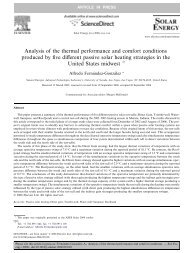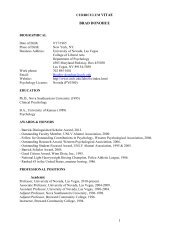2013 Conference Proceedings - University of Nevada, Las Vegas
2013 Conference Proceedings - University of Nevada, Las Vegas
2013 Conference Proceedings - University of Nevada, Las Vegas
- No tags were found...
Create successful ePaper yourself
Turn your PDF publications into a flip-book with our unique Google optimized e-Paper software.
active learning and collective participation using collaborative learning, and supports thegrowth in teacher participants’ knowledge and beliefs. The project consisted <strong>of</strong> two-weeksummer institutes that focused on intensive content and pedagogical content knowledge(Shulman, 1986; Hill, Ball, Schilling, 2008). We then met twice monthly, once face-to-faceat the university and once online. In the face-to-face sessions, we presented math and sciencecontent using strategies to promote student learning, modeling classroom practices for theparticipants to take back to their classrooms. The online meetings focused on the judicial use<strong>of</strong> technology and best practices for incorporating technology to support learning. Thispr<strong>of</strong>essional development for mathematics and science teachers provided inquiry-basedmethods including Japanese Lesson Study, Problem-Based Learning, and Action Research.Research based instructional practices were modeled with the intent <strong>of</strong> teachers incorporatingthese strategies into their classrooms. The pr<strong>of</strong>essional development also focused on thejudicious use <strong>of</strong> technology in the classroom to enhance student learning. Data collected forthe pr<strong>of</strong>essional development project allows the researchers to explore the effects <strong>of</strong> a longtermpr<strong>of</strong>essional development with focused math and science instruction on teacherperceptions, classroom practices, and student learning.Inquiry-based learning methods were chosen as the basis for the pr<strong>of</strong>essionaldevelopment for their student driven strategies, higher thinking objectives and constructivistteaching philosophies (Curcio, 2002). Inquiry-based learning is a student driven methodincorporating collaboration, critical thinking, and instructionally focused teaching/learningmethodology connecting prior leaning with present learning. Inquiry-based learning is aprocess <strong>of</strong> answering questions through learning, not only using acquired knowledge incontent areas, but using prior knowledge to make connections.Data collected throughout this project included classroom observations, interviews,surveys, and classroom level student achievement reports. In order to measure changes inteacher self-efficacy, the Teacher Self-Efficacy Scale (Woolfolk and Hoy, 1998) was used.The scale consists <strong>of</strong> forty-three items across three subscales in Likert format. The Likertscale was designed to measure opinions and attitudes on a scale scoring from “strongly agree”to “strongly disagree,” each being given a number score with values from one to nine, withnine representing “strongly agree.” Mean scores were used to determine high and low areas<strong>of</strong> teacher attitudes and beliefs with regard to their knowledge <strong>of</strong> content and pedagogy. This<strong>Proceedings</strong> <strong>of</strong> the 40 th Annual Meeting <strong>of</strong> the Research Council on Mathematics Learning <strong>2013</strong> 110




